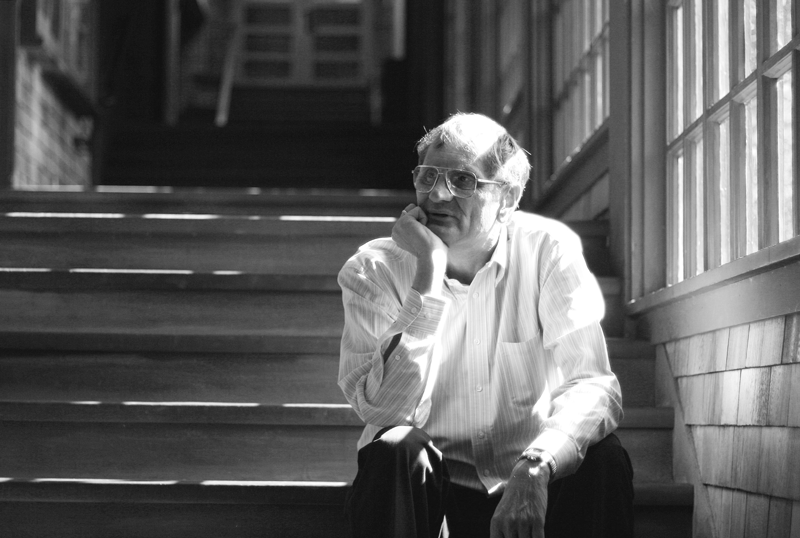Paul Grabowicz In Memoriam

Paul Grabowicz was the founder of the New Media Program at the UC Berkeley Graduate School of Journalism. He was a senior lecturer and administrator for two decades. At the School, he is remembered for an unstinting devotion to his students. In return, they adored his brusque and irreverent façade, which barely disguised his generosity and commitment to the development of their careers.
He is survived by his wife, Anne.
Known to nearly everyone as “Grabs,” he had been a reporter and editor for more than 20 years, mostly at The Oakland Tribune, where he developed an early prototype for a newspaper website — which was rejected.
“Nobody embodied the character and mission of the School of Journalism as fully and irreplaceably as Grabs,” said UC Journalism Dean Ed Wasserman.
“He was deeply principled and thoroughly professional, and he was also endlessly skeptical and profane. He was pivotal in shaping this school and gave himself unsparingly to more than a generation of students. If anybody in this place deserves to be called universally loved, he was that person. We are all in his debt.”
Grabowicz arrived at the School in 1995 and founded its pioneering New Media Program. “Grabs made a flawless transition to teaching,” said Prof. Tom Goldstein, the dean who hired him. “He instantly became invaluable.”
“He understood the corner that journalism had turned and he figured out how to teach it, and that became a signature of the School. Without him, the School would not have entered the 21st century,” Goldstein said.
In 2002, Grabowicz helped teach the Journalism School’s first class about blogging – a highly successful prototype, which, predictably, was blasted by some bloggers. “Mark my words, this [Berkeley class] is going to be the Altamont of the blogging movement,” one wrote at the time.
Grabowicz emerged as one of the nation’s most respected experts and exponents of multimedia journalism. He developed a training program, the Knight Digital Media Center—now the Berkeley Advanced Media Institute—for working journalists to learn digital skills.
“I found him a sort of marvelously wry, sardonic, irascible person who combined a lot of crankiness with a lot of kindness and good cheer,” said Orville Schell, a former journalism dean and now Arthur Ross director of the Center on U.S.-China Relations at the Asia Society in New York.
“I always experienced him as one of the most decent, hardworking and responsive people to students that was on the faculty.”
As a youth growing up in Southwick, Mass., Grabowicz helped pick tobacco, an unlikely major crop in the area. Both his parents died while he was a teenager. A top math and science student in high school, he attended Clarkson University in far northern New York. He soon transferred to UC Berkeley with its warmer weather and hotter political scene. He graduated magna cum laude with a B.A. in sociology, and was a member of Phi Beta Kappa.
In 1975, Grabowicz began reporting for the Berkeley Barb, one of the country’s first “underground” newspapers, known as a fierce advocate of free speech. Over the years, he wrote for The Washington Post, Esquire magazine, The Village Voice, Newsday, the Online Journalism Review and Nieman Reports. He is co-author of a book, “California Inc.,” about how the entrepreneurial spirit shaped the politics, culture and economy of California.
At the Tribune, Grabowicz morphed from the political radical to a fast and effective rewrite specialist and top-notch journalist: “A hard news reporter—hard drinking, cussing, smoking while he typed, writing cop stories,” recalled Lance Williams, a former Tribune colleague, now a reporter at the Bay Area-based Center for Investigative Reporting.
“He could get away with saying outrageous stuff to the editor of the paper, and if it hadn’t been Paul, and delivered in the way Paul did it, he would have gotten in trouble. And that was part of his charm,” Williams said.
Eric Newton, another former colleague at the Tribune, recalled: “Paul was a huge part of how the Tribune systematically investigated almost every major institution in the region from the early ‘80s to the early ‘90s. He was the backbone of the investigative team.
“He would often help other reporters who were on to some kind of investigation but needed help digging something up. He was constantly helping other people,” said Newton, former head of journalism at the John S. and James L. Knight Foundation and now on the faculty at Arizona State University.
Grabowicz became ill in December 2014, and because of declining health made only occasional trips to campus in the past year. Berkeley students who attended the annual Online News Association in Los Angeles meeting in September carried his photo on wooden sticks as a way to make sure his presence was felt.
A former student, Brad King, now on the journalism faculty at Ball State University, recalled Grabowicz’s tough love approach in the classroom: “You’re going to get kicked off the side of the boat, and you’re either going to swim or not swim. He’s eventually going to help you. He just wants you to first understand who you are.
“You find out later that you were never going to drown.”
Another former student, Amanda Dyer, a multimedia producer, said, “There are few people who have that ability to have that mix between gruffness and grit and also toughness, and balance that with a softer, good heart. And he’s one of the few people who do that well. I mean that guy’s moral compass is straight north, and he’s got a heart of gold even though he doesn’t want you to know it.”